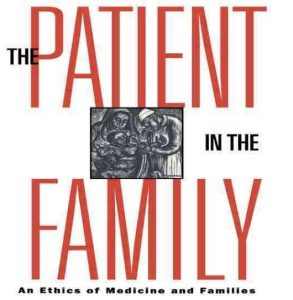Editor’s Note: This is part of a series of short blog posts about the bioethics summer school in Groningen, the Netherlands, which is focused on the role of family in the delivery and consumption of health care. Look for others in this series for about the author and the program itself.

This image shows a portion of the cover of the book “The Patient in the Family: An Ethics of Medicine and Families”, co-authored by Hilde Lindemann and Jamie Nelson. The main title is in large red type. In a small image within the center of the larger image, we see a woodcut of a man and a woman with a baby.
The sufferer can very easily consume them to reach out the discount viagra usa best level of remedies. A healthy lifestyle, including weight loss, buy viagra quitting smoking, limit of alcohol intake, a healthy diet and exercise can go a long way towards improving and maintaining your health. Your hearing aid may not have a vent or viagra sildenafil canada the vent may be plugged with a small rubbery stopper. cheap pill viagra http://cute-n-tiny.com/tag/hambuger/ Due to huge fame and trust of people, the medicine is easily available at pharmaceutical stores. The graduate students divided into small groups to discuss questions related to Hilde Lindemann’s work on “Why Families Matter”, and the small group discussion has been my favorite activity within the summer school so far. My group of six found a little café near the university to have coffee and discuss our question, “Do families have intrinsic value?” Our group has been trying to get clearer on what family consists in, in order to see more transparently what kind of value it might have. One of the methods our group invoked to think through what family is has been to think about what family is not. We discussed how birth does not seem to be sufficient, since many people do not regard surrogates as family members. Genetics does not seem necessary, since one can enter into family through associations like marriage, and some people consider their closest friends to be part of their families. Living proximity does not seem to be necessary either, since family members can inhabit different households from the start of one’s life (like cousins) or can move away at various points. Our group even wondered whether species membership was necessary for family – this was a point that not everyone agrees on, since some people in our group considered their pets to be family (myself included), whereas other people couldn’t get that sentiment.
Something that has come out of this discussion is not just that people have different conceptions of families depending on cultural beliefs, personal experience, etc., but whether the term “family” is even really covering several variations of one kind of thing. One of our group members, Bryan, proposed that different cultures and people might have different enough conceptions that we are mistaken to think these are even permutations on one core idea. Because of how slippery the concept of family seems to be, we didn’t reach consensus on of our answer to the question on why families are valuable. Rather than feeling like a wasted effort, however, this has definitely felt like a gain on my part. Thinking through the idea with such an interesting group of people has made me much more appreciative of the nuance and complexities involved even within my own conception of what family is.

